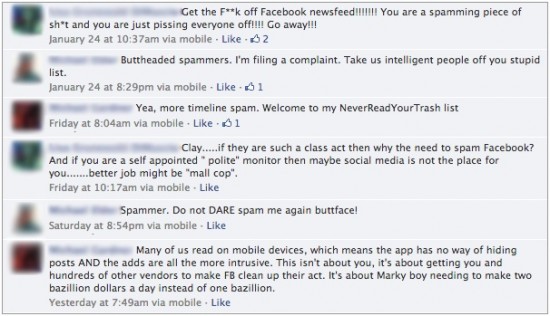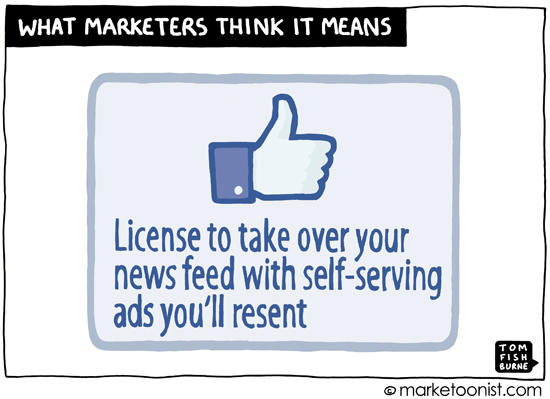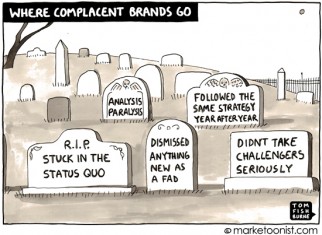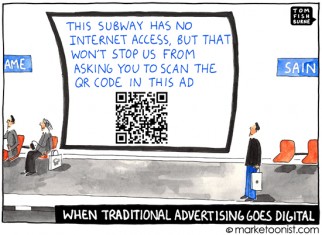We’re still figuring out what it means to be a social brand.
This month, Facebook redesigned its News Feed to provide even more real estate to advertising. They also announced that the sponsored stores they’ve created in News Feeds haven’t turned off users the way they feared. That means that opportunities will continue to increase for brands to elbow in front of their audiences socially.
The opportunity isn’t about real estate though. It’s about what brands do with this real estate. As the lines continue to blur between advertising and engagement, it’s up to brands to make sure their presence is welcome. If brands treat Facebook as interruption media, their audience will treat them as interruptors.
Here’s a cautionary tale and a screen shot from a Wistia called “Facebook Newsfeed Advertising: Why We Won’t Do That Again.”

Wistia shared this observation:
“When advertising is styled exactly like a post from a friend, it feels tricky, but we’re not falling for it, so all it does is make us angry … Your post doesn’t have to be sales-y to get people riled up. We made a point of focusing our first sponsored Newsfeed post on useful content that was available for free. But it’s not about what you’re posting, it’s about where you post it and what people expected to see there.”
It shows the perils of reaching an audience socially even with the best intent. What’s clear is that there will continue to be more of it.
Ultimately I think it’s up to brands, not Facebook, to figure out how to act in this new world.
(Marketoonist Monday: I’m giving away one signed print of this week’s cartoon. Just share an insightful comment to this week’s post by 5:00 PST on Monday. I’ll pick one comment. Thanks!)



Boris Borchert says
I would love to know if someone checked out if the sponsored posts on twitter earn the same reactions. I have the feeling, they get there more ignored if not welcome, but it´s just a feeling and I would prefer facts.
Courtney says
Agree 100% with this! Brands are mistaking what FB wants with what consumers want and the lines are being crossed. The rules of social have not changed. Be relevant, timely and engaging and you’ll get results. Spam is not the answer. Ever.
Ann Handley says
I couldn’t agree more, Tom! This is exactly right: “If brands treat Facebook as interruption media, their audience will treat them as interruptors.” Facebook (and other social platforms) offer a rich opportunity for brands to connect with customers. I don’t use that word “opportunity” lightly, because I think we need a shift in mindset.
Stephen Lahey says
To play devil’s advocate: well executed humor (in ads) might pave the way to acceptance by Facebook users. Everyone likes to laugh.
Alyce Currier says
I wrote the Wistia article, really awesome to see it illustrated here! 🙂 Thanks for featuring it and great cartoon!
PeggyC says
So true. Content is king. It’s about quality, not just quantity. Having begun my career in the creative department at Hal Riney, I was raised on the “I’d rather have a sharper nail, than a heavier hammer” motto. Most brands can’t afford the heavier hammer—they need the sharper nail. One advice to brands, trust your agency. You know your brand better than we do, but we devote our lives on how to connect with consumers.
DSprogis says
I found myself stunned on a couple of occasions when social occasions turned commercial. Each situation was a little different but imagine yourself sitting around a living room with friends having a drink and some laughs. Then, the host breaks out a catalog and starts showing you some of the things they bought. Then, the host tells you that you can order anything you want through him or her. “Yeah, how about that, I’m a rep and I can get it for you cheaper than anywhere else.”
.
I hate context shifts like this because I hate sales people. When a friend or an acquaintance shifts into sales gear, I shift into hate mode. In every case, my evening went from open and engaging to closed and resentful. In one case, I walked out. In another case I got into a fight with my wife who fell for some of the crap the host was selling.
.
I am sure the flamers on Facebook had much the same feeling I had at these “parties”. However, Facebook is in the business of monetizing social interaction so it comes as no surprise that the company would test the limits of what members will tolerate.
.
My advice is to walk away from Facebook. When the social-advertising equation doesn’t work any longer, walk away. Someone else will create a new Facebook with a better equation.
Tanya says
I think that just like everything else with Facebook, we should be able to switch advertising on or off, or decide how often we want to see it, where we want to see it on our feed, and by who, which I thought was the whole reason for all this “liking”, right?. And while I am mentioning this, we should be able to choose the language of the ads, too. I have English FB, but because I am living in a latin country, all the ads are in Spanish. Doesn’t make sense. I could understand this if I was using the Spanish Facebook application….just goes to show you that they have not worked out the kinks and frankly, I beleive they are headed in the wrong direction and if they continue forcing so many ads on us, they will make FB the anti-social media site.
Ori Pomerantz says
I agree with Stephen Lahey. If you’re going to be in my news feed, make me want you there. Be funny, be useful, or be considered an intruder.
If I may give an example from my own work, I run two “tip of the day” Facebook pages for people who provide cop/soldier and firefighter training (https://www.facebook.com/pages/Sheepdog-tip-of-the-day/242563879102590 and https://www.facebook.com/pages/Fire-Service-Warrior-Tip-of-the-Day/245175218891959). Every day, the people who like those pages get a subtle reminder that they should work on improving their “not dying on the job” skills, and that those providers can help them. But they don’t mind, because they mostly get tips about how to survive their jobs.
Dalila says
“They also announced that the sponsored stores they’ve created in News Feeds haven’t turned off users the way they feared…”
I don’t know how they can make such a statement since it doesn’t have an option to choose NOT to get those ads or to comment on them. I’ve looked and looked and there’s not a single option to avoid getting those annoying ads.
I’m thinking about stop liking anything on FB so I can get feeds only from my friends.
Also, I’ve started to mark those ads as spam… if they – and I mean FB here- are annoying me so much with their ads, I guess I have all the right to annoy them with my ‘spam’ flags 🙂
Ori Pomerantz says
Dalia: I don’t know how they can make such a statement since it doesn’t have an option to choose NOT to get those ads or to comment on them. I’ve looked and looked and there’s not a single option to avoid getting those annoying ads.
Ori: There is an option – not to use Facebook. Facebook means that the ads aren’t annoying enough for people to stop using them, so they are “working” (for some value of working). I agree about marking those ads as spam – I do that too.
Concetta says
“They also announced that the sponsored stores they’ve created in News Feeds haven’t turned off users the way they feared.”
That’s a big win in the FB book. They turn people off all the time.
For the most part, I’ve learned how to manage my own feed, turning on and off the various options to view photos, categories of status, etc. FB corporate doesn’t interfere with it too much, and yes, I did upgrade already to the graph search (which has very entertaining results but does do some triflingly useful stuff). I do like a lot of stuff on Facebook, but I only keep a tuned eye for my favorites of the favorites when I’m looking through my feed.
A brand that I “like” could be posting lots of annoying stuff and I might never see it because I’m not looking for it. But I have the feeling I’m the minority of users and most people don’t spend enough time on the site to configure all of the settings I’ve done.
Srinivasan Narayanan says
I came across these intrusions sometime ago in FB. Thought it was a mistake. Then realised that they are actually intended to be inserted in between news feed entries. I am reading them. You know why? So that I will never make the mistake of buying what they sell and instead but from the rival brand. Sounds obnoxious thing to do? Exactly, just like their intrusions! 😛
Mads Gorm Larsen says
I advertise with facebook ads in the newsfeed, and my ads are interruptions. I stick a sign up saying “Get to know more about XYZ”. All the social media expert hate it, it’s not content marketing, it’s not social, it’s old fashioned. But I get in contact with those 5% who wants to know more about XYZ, and those 95% who got annoyed for my interruption they don’t matter to me. That is the way facebook allows us to advertise, and yes if your Coca Cola you don’t want to upset people by spamming them. But most companies just aren’t Coco Cola:)
tomfishburne says
Hi all,
Wow, excellent (and varied) perspective from everyone, thanks! This week’s print goes to DSprogis. I love the examples of the live parties where social situations turned commercial. There are so many marketing behaviors that would seem bizarre if they happened in our personal relationships. Great stuff, thanks!
-Tom
Jennifer says
This post reminds me of what Seth Godin pointed out: “Permission marketing is the privilege (not the right) of delivering anticipated, personal and relevant messages to people who actually want to get them. It recognizes the new power of the best consumers to ignore marketing. It realizes that treating people with respect is the best way to earn their attention.” (http://sethgodin.typepad.com/seths_blog/2008/01/permission-mark.html)
From a consumer behavior perspective, a consumer’s perceptual process includes exposure, attention, and comprehension (interpretation) stages. A bigger, more prominent place of brand messages on Facebook can create more exposures, but that does not guarantee consumers will pay attention to them or even result in positive interpretations (assuming exposure, consumers may just ignore the ads; assuming attention paid, the ads may very likely just annoy them and turn them away!). Sure enough, self-serving ads in news feed will not earn likes but resents, as Tom’s cartoon depicts.
asit gupta says
The 1st outcome of social marketing is brands engaging with consumers as friends, before they can expect consumers to talk about them to their friends. Most brands are expecting the 2nd outcome w/o doing the 1st. It belies everything we know about human behavior.